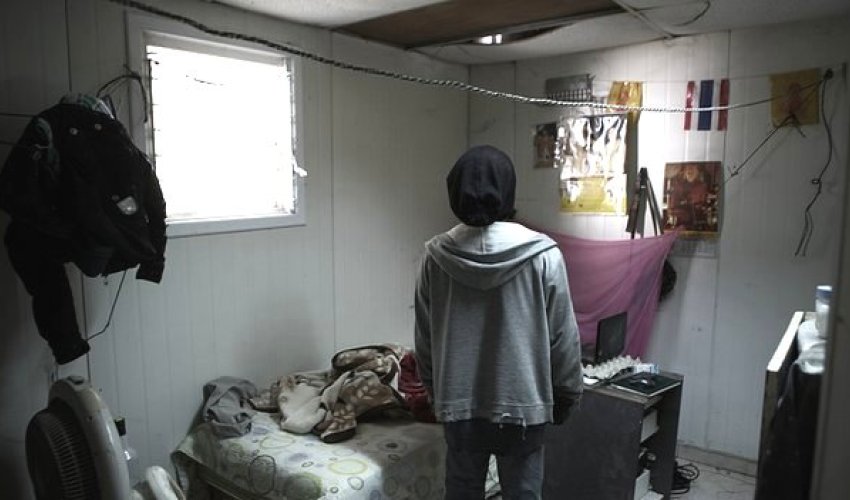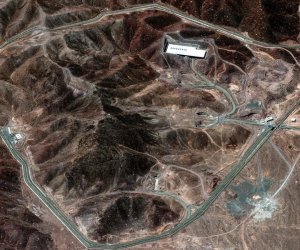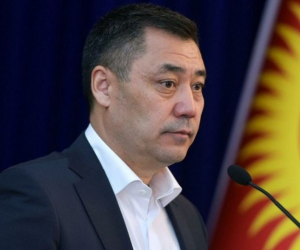Israel's Thai farmworkers tell of grim plight

Thirty-nine-year-old "Thanom" lives in dilapidated, cramped accommodation behind a reeking cattle shed.
He is one of 15 Thai migrants who work on the farmland of a picturesque moshav - an Israeli agricultural community - near Tel Aviv.
I met Thanom (not his real name) and two other workers, treading around a stream of animal sewage, as they packaged onions into boxes.
All were visibly nervous, not wanting to be identified out of fear of getting into trouble with their employer for talking to a journalist.
Thanom showed me their claustrophobic sleeping quarters, where three workers share a tiny room next to a squalid kitchen.
Above us a ceiling punctured by large holes and a roof which was falling apart. The cattle was housed just yards away, the stench of their excrement hanging in the air.
Paid just 130 shekels ($30; £20) a day, Thanom earns 30% less than Israel's minimum wage, and sometimes works longer than the legal eight-hour day.
He has lived like this for three years, but feels there is no point in asking his employer if he can move
When questioned about the situation, the chairman of the moshav, Amiram Rom, said he was alarmed.
"I'm surprised to hear there are Thai workers in my village that live in such conditions," he said. "I feel ashamed that farmers behave in such a manner, and will take action to correct it."
'Blind-eye'
Thanom is one of about 22,000 Thai workers heavily relied upon by Israel's agricultural industry.
His case is one of many brought to light by Human Rights Watch (HRW).
In a recent HRW report, 173 Thai workers on 10 farming communities in Israel said they were low-paid, worked excessive hours often under hazardous conditions, and were denied the right to change employers.
Almost all were housed in substandard accommodation. Several said they had suffered retribution after protesting to their employers and complained of problems accessing healthcare.
In 2011, Israel and Thailand agreed to improve the process of recruiting agricultural workers and improve Israeli laws on working hours, minimum wage and unionisation.
The agreement also reduced extortionate fees charged by private Thai and Israeli recruitment companies, which sometimes exceeded $10,000 (£6,600), by capping them at $850 (£560) per head.
However, the HRW report highlighted continuing labour abuse, suggesting a lack of government regulation or ministerial co-ordination to ensure the effective enforcement of Israel's labour laws.
"It [the government] is turning a blind-eye on workers' rights violations," says Noa Shauer of the Workers Hotline, an Israeli non-governmental organisation which assists foreign workers.
"Workers need to be paid a fixed, full-time salary. But they're instead paid per hour, per day. So they don't want to miss a day's work."
Despite earning below minimum wage, and having previously been entitled to tax credit points, as of 2015 workers are paying full taxes, says Ms Shauer, "meaning Israel is also going to earn from them".
"So the state doesn't have any motivation to create an equal labour market or encourage local employment."
Unexplained deaths
One of the most serious allegations concerns a number of farm-worker deaths.
Between 2008 and 2013, 122 Thai nationals died while employed on Israeli farms, according to government figures reported by Israel's Haaretz newspaper.
The causes ranged from accidents, alcohol poisoning, heart failure and suffocation, to fire, suicide, beating and stabbing, Israel's Ministry of Health says.
The ministry notes 43 of these deaths were due to "Sudden Unexplained Nocturnal Death Syndrome" (Sunds), a rare condition, whose causes are little understood.
A further 22 deaths had no autopsy and were noted as "unexplained".
"We were working so hard, with no holidays or breaks," 32-year-old Thai worker Decha tells me over the phone.
He says he used to work 13-hour days on a cucumber farm, seven days a week, for nearly three years.
"People get so tired that their bodies cannot take it."
He said his colleagues complained of skin allergies, headaches and respiratory problems from handling pesticides without protective clothing, and asbestos in their accommodation walls.
Noa Shauer says foreign workers do not always exercise their rights.
"Not every worker with ailments will go to a doctor," explains Ms Shauer. "Healthcare providers and doctors do not speak their language, and no-one is providing them with translators."
Inspections 'stretched'
HRW says Israel needs to do much more to stamp out abuses of foreign agricultural workers.
"They're being worked incredibly long hours under incredibly hot conditions," says HRW's Nicholas McGeehan, who wrote the report.
"We've severe concerns that many are actually being worked to death, and that the Israeli authorities are not properly investigating the extent to which these deaths may be related to living and working conditions, instead falling back on an excuse that Thai workers are genetically predisposed to cardiac death."
Israel's Ministry of Economy, which is responsible for protecting employees' rights, was asked for a response but declined to comment on the cases involving workers' deaths.
Oversight of the industry also appears to be stretched.
A Haaretz report in March 2014 quoted an official as saying just 20 government inspectors shared a heavy workload in checking the country's entire agricultural sector.
The Ministry of Economy says there are currently 50 full- and part-time inspectors (out of 270 regulation enforcement staff) who are responsible for inspecting 5,000 farms.
It says inspections take place when complaints are received, but did not clarify whether inspections are also routine.
The ministry says that since 2010 it has dealt with almost 500 complaints, and imposed more than 400 warnings, 31 fines, and seven indictments.
The government is taking measures but for now, exploitation is a price Thai workers like Thanom are having to pay.
(BBC)
ANN.Az




































 Photo
Photo 



 Video
Video 

